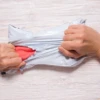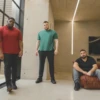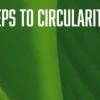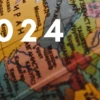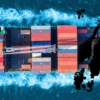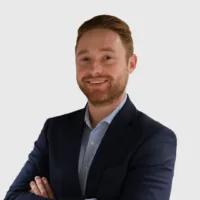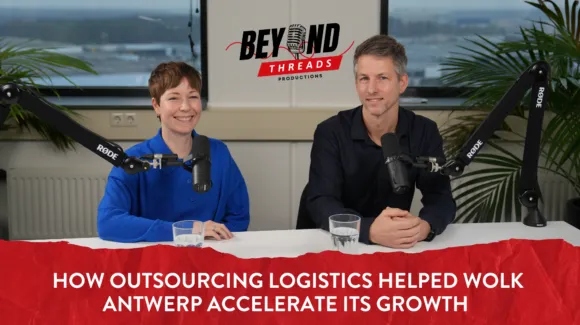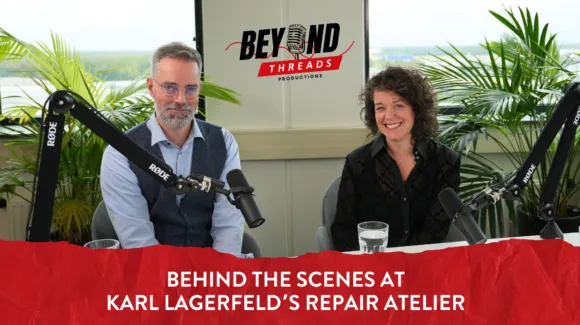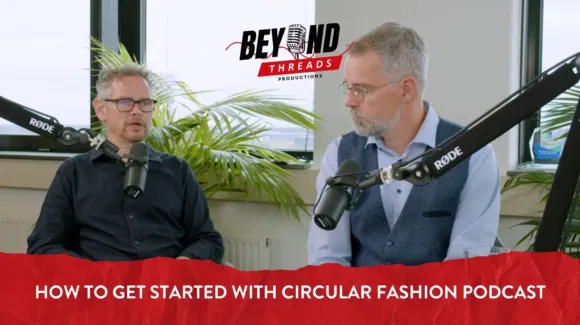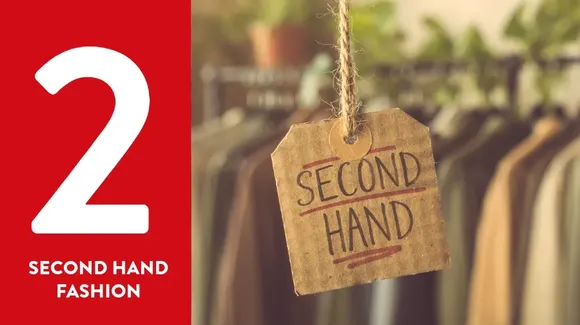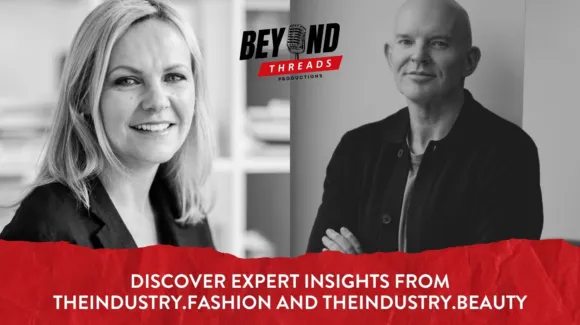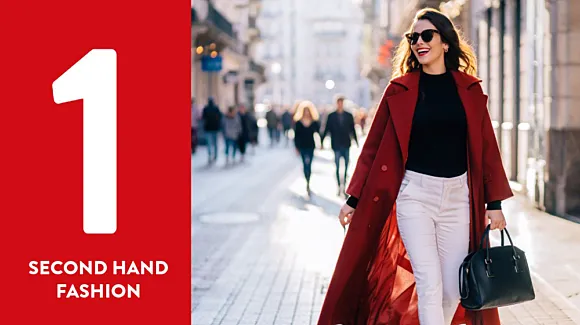Welcome to the latest edition of our Beyond Threads podcast. In the previous episode, we caught up with the co-founders of luxury menswear brand Wolk Antwerp, Ellen Cattebeke and Joris Smeunix. This time, they’re back again to chat with Maxim Sion, Global Sales and Business Development Manager at Bleckmann. Check it out now to learn more about how Bleckmann’s new plug-and-play logistics solution, Bscale, is helping Wolk Antwerp take its logistics to the next level – and changing the game for fashion brands of all sizes.
Simplifying access to logistics expertise
Many small and medium-sized brands can find it difficult to access high-quality fashion logistics services due to factors such as prohibitively high minimum volume thresholds and onboarding costs. To address this, we’ve developed an innovative solution: Bscale. The Bscale concept provides brands of all sizes with a ready-made, full-featured logistics package without the usual cost barriers or volume thresholds. “Bscale brings together all of Bleckmann’s fashion logistics expertise and capabilities into one simple, scalable package”, says Maxim. “This ensures that it’s accessible to smaller brands while offering the potential to grow with them to support their development at every stage of their expansion journey.”
A fashion logistics solution for brands of all sizes
Bscale has been specifically designed with the needs of growing brands in mind, enabling them to access a quality of service and scalability previously reserved for larger players. “Thanks to the strength of our existing resources and networks, you don’t have to be a Gymshark-sized brand to benefit from cost-effective, modular and specialised fashion logistics services,” explains host Erik Janssen-Steenberg. “Brands of any size that work with us can profit from our collective buying power, decades of fashion logistics expertise and impressive portfolio of capabilities to take their logistics operations to the next level.”
Listen To Audio Only
Leveraging our capabilities to drive growth for your brand
The Bscale package features a wide range of optional fashion logistics services to give your brand full control over the customer experience. These include dashboard analytics for a detailed overview of your operations, integrated returns management and a circular repair option, among other value-added services. “We were really impressed with how approachable and knowledgeable Bleckmann was throughout the onboarding process and once we were up and running”, says Ellen. “They gave us useful advice on many details that made it much easier for us as we scaled up operations – such as introducing barcoding.”
In addition, the individual attention that the brand received at every stage of the process was a key benefit. “Bscale is far from a one-size-fits-all offering,” concludes Joris. “For example, when we wanted to change the type of packaging used, Bleckmann helped us find the ideal solution. We’re excited to continue our growth journey together with Bleckmann and Bscale.”
Want to find out more about how Bscale can help brands of all sizes take their logistics to the next level? Press play on the latest episode of the Beyond Threads podcast! You can also discover the Bscale solution in detail here.
_____________________________________________________________________________________________________________________________________
Transcript
Erik Janssen Steenberg: Hi, and welcome to another episode of Bleckmann's Beyond Threads podcast. Today is the second episode of the conversation we're having with the brand Wolk Antwerp. And for that, I'm today again joined by our lovely guests.
Ellen Cattebeke: Hi, Erik.
Erik Janssen Steenberg: Welcome. So last time Joris and Ellen already introduced themselves. Their company as well. Can you please do us the same favour?
Maxim Sion: Yeah, of course. So my name is Maxim Sion. I've been working for Bleckmann for two years now. As you said, in the Business Development department and Sales. I was asked to join the team. And to give my background experience a little bit: I had a fashion company for nine years. I started during my high school period. So back then we started with selling bracelets and two retail stores. In one year time we scaled up to 50 retail stores. With that momentum we tried to launch a few t-shirts. And from then on, the brand grew a little bit, step by step. In the first years we did our logistics ourselves. In 2016...
Erik Janssen Steenberg: What's the brand's name?
Maxim Sion: Black and Gold. Didn't I say it?
Erik Janssen Steenberg: No, but that sure makes sense. Continue.
Maxim Sion: So in 2016, we decided to move our logistics out. So we checked which players were on the market. Different logistic companies specialized in fashion. I was in contact with Bleckmann and we did a try-out in 2017, I think. At that time it was easier as a smaller company to join Bleckmann because back then it was also a much smaller company. Today that's more difficult. And from that angle, is where my experience comes in in the Bleckmann team to create a solution for smaller brands. So we built Bscale out of that idea and that's going live in January next year.
Erik Janssen Steenberg: And can you explain to the listeners. Of course, you and I, we have lived and breathed it for several quarters now. But what is Bscale? Why is it so important for us, but also for smaller, emerging and medium-sized brands? And what's the distinct difference between Bscale and let's say, the traditional Bleckmann services?
Maxim Sion: So in the traditional Bleckmann service of course we are adapting to the client. So that's our standard process. And onboarding a standard client is very intensive for our teams. So there's a lot of people interacting and it's costly. And that's the reason why smaller clients were not able to join Bleckmann before. So what we created is a platform, an online tool, where people can just self-onboard connecting their Shopify easily to Bscale and they are integrated in the Bleckmann environment very quickly. So all the pressure on our internal resources is gone with this solution. So everybody's happier to receive a smaller client. So that's really good. And it boosts the site managers and the operational people to be happy to welcome a new brand. At the same time, we're also trying with the Bscale dashboard to have a solution ready for clients so they have a dashboard, analytics, order overview, easy return overview and a return page. So everything they need to make their customers happy is included in the package. And to me the only big difference between the standard way of what we are doing and Bscale is that with Bscale we use more of a generic way of working. So we are using an automated storage system in the warehouse with a standard box with later on the possibility to personalize it with like a printed flyer or a box print. And that's the way we are going to proceed for the start-ups to mid-size companies.
Erik Janssen Steenberg: So summarizing: Traditional Bscale is proficient in making bespoke solutions. However, that generates a high level of additional costs in developments, integrations, onboarding, et cetera. Whereas Bscale is much more founded on standardization, automation. Therefore allowing brands to benefit from each other, the buying power, et cetera.
Maxim Sion: Yes. And also to bring all the separate services that Bleckmann has together in one channel, under one roof. Because today, a bigger client needs to have separate services agreements. They need to connect their systems to it, to use it. And with Bscale, we just try to have a modular plug-and-play system.
Erik Janssen Steenberg: Very good. Very good. Okay. Thank you. So Ellen, Joris, we're continuing the conversation that we had in episode one. You explained to us why Wolk Antwerp. What you have encountered in your path to your current success. And this second episode is much more centred around what are you seeing these days and what triggered you to reach out to Maxim and see if we can add value.
Joris Smeuninx: We are at this point at the moment. So in the previous episode, for those who listened they know that we did all the fulfilment ourselves up till now. It was something that we didn't really want to do in the beginning and then didn't want to give out of our hands anymore because we learned that our customers really liked the personal contact we had. We sent little notes and we contacted them by email. And from all the reviews we get maybe 1 in 5 reviews really mentions the good support they got. So then we got afraid to give it out of our hands. And we thought that the way we were doing things was the best way ever and there's nothing that's going to match it. But then it just gets too much, you know, you can't keep on doing it yourself. So we looked at having externals coming in the company to do it in-house. And then at the end we realized that basically a specialized 3PL partner would be the way to go. How we ended up with Bleckmann, that was the question, right? Bleckmann was actually already on the list, as the only one because of an article I once read. An interview with Essentiel about their logistics. And I thought: this is really interesting, because we need someone who is specialized in fashion. We were worried about handling of the products, the returns, ironing, steaming getting everything back in shape for retail. So I saved the article somewhere. And then of course, you always want a benchmark. So I did an online search, contacted four companies. It's mostly online sheets you have to fill in and then you get some questions back and emails. But we also got a phone call from Maxim which was a surprise because we had met Maxim already at a fashion event. And we were surprised that Maxim was inside Bleckmann, the fulfilment partner. On the other hand, it was really assuring because we had one of us inside the logistics partner. He also ran a fashion company. He's a founder. He knows what struggles we have. So it was a really easy conversation for us. So we had some calls. Then we visited Grobbendonk. We saw the site. Yeah, that was really impressive. It wasn't active yet at that time, but we saw the setup and the whole system.
Maxim Sion: I think we met at exactly the right time because we were creating a system for smaller start-up clients to mid-sized companies. Because before it was not possible at Bleckmann. So in that way it was really the right time to meet each other. And the visit was really nice.
Ellen Cattebeke: Yeah, it was really nice. I remember that we were driving up the roads to Grobbendonk, to the warehouse. And we were like: oh my God, it's so long. It's about one kilometre or something. Really, really impressive. And then all the security to get in and we were like: wow. And we can work with them? So we were feeling special.
Erik Janssen Steenberg: You can't imagine how proud that makes me. So on the one hand, you start talking to us or with us based on the fact that we have the qualifications. You know we can do it. But you continue to talk because you like what we're saying. You like our approach and what we're doing. So without trying to blow our own horn too much, that makes me really proud. Also because we are still flexible enough to adapt and overcome. So previously, we were the world champion in making bespoke solutions for large enterprises. So on the one hand, that means that those companies get exactly what they ask for. And we fully support their approach to their customers, their message and product.
But on the other hand, that also spells high levels of cost associated with integrating realization of a project which means that the threshold is very high for companies like yourself to start with us. And previously, I had the same idea, but I didn't have the readily available knowledge which Maxim clearly does have to come up with something like Bscale. Removing the threshold, making it easier for companies like yourself to work with us. And more or less benefit from all the learning curves and all the investments we have done. And ride the wave of our success together. That's unbelievable. That's the win-win-win that I'm working at Bleckmann for.
Joris Smeuninx: That was also kind of the mindset for how we did the visit. We're very proud of how we package things. We think it's really nice. But we really wanted to enter with a blank page and have a look at: How would you propose doing it? You do it for so many different brands. You explained to us that you wanted a standardized system to keep the costs low. So for all the scale-ups to be in the same system and have a similar way of handling packages. And we really wanted to take that step back from all our specifications maybe. And then see: okay, what if it was the complete standard system. How would that turn out? Because you know what's most efficient. But then we saw here and there that that's maybe not for us. Like for example with the poly bags. We're a high-end brand. We understand that it's really efficient to take just the packages out or the products out of a box and ship them like this. When I order a package from Nike, it also arrives in the poly bag. No problem. But for us, that didn't match the brand. But then you were also really quick to say: I'll just put this topic in the system and see with management what we can do. And I think in two weeks or something...
Ellen Cattebeke: No, I think we got a phone call the other day. 'Yeah, I talked about it and we can fix it.' So we were really surprised. What's really nice is that we felt listened to and that's really, really valuable for us.
Erik Janssen Steenberg: That's exactly what I meant because the unboxing experience of your customers is way too important. So that would indeed be a showstopper if that wouldn't have been possible. And Maxim, kudos for taking up the glove and getting that discussed, solved and embedded in the process.
Ellen Cattebeke: Also because he knows it's important. He has, of course, his own brand.
Maxim Sion: So also in a way the biggest difference between the normal operations we do as Bleckmann and Bscale is in Bscale we try to support the brand. What's the most logical way to have barcodes, for example, on a package. And even with the unboxing experience, what's possible to do?
Because that's also really important. The silk paper wrap, we didn't have it at first. But for a brand with a selling price like you have you need to have like a silk paper wrap to give that experience back. And we are a fashion expert logistic company. So it's important that we have silk paper in the process. In that way it's the logical next step.
Joris Smeuninx: And indeed, as you say, for us you feel quite approachable. Like we never had barcodes. We never needed it. No, cause you know your own product. But you were able to send me some files, like: 'Okay, this is quite standard. You can make your barcodes, we choose one, here is the way to do it. This is how we or most of the brands label their packages, this is how it is supposed to be.' So with another partner if there hadn't been this connection or the personal contact I would have spent probably 2 or 3 days figuring it out and not being sure if it was the right way because maybe I would be afraid to ask, I don't know. But that really helped. Thanks.
Erik Janssen Steenberg: So can we say that it helped you conclude that you could outsource your business in such a way that you will not lose your own entity and you will not lose, I don't know the efficiency in getting your brand across in the way that you want.
Ellen Cattebeke: Yeah, I think so. It's like Joris said: In our mind it was like that. But we are open to suggestions from your side. We will also think about a more digital approach. For every problem there is a solution. So it's good for us as well to take that step back and to see how we can evolve together with you. And we're looking forward because it's fresh. So we will tackle a lot of hurdles probably in the coming months but we're confident that everything will run smoothly, definitely.
Maxim Sion: It's also a shift a little bit. Like now the experience is more physical and it will be a bit more digital. But that's not a bad thing. In a way, you still have the silk paper wrap, you have a flyer so you still have enough to make it personalized.
Joris Smeuninx: And the digital way isn't necessarily bad. Like right now the package comes with a card with care instructions and a little bit of information about the benefits of merino wool. And on the back we write a personal note. We also know the customers or we see in Shopify how much they've ordered. And we say: Hey, nice to see you back. But when you start the onboarding process, you start thinking about other solutions. It doesn't have to be a different card for everyone. It can be one standardized card. And the message can come by email. It can be a really nice message in the inbox. Because all the emails you get are either so salesy or it's an overload. But if there's a message thanking for the second order or the third order, it can even be automated. The people won't know. So right now it feels good. Because with packaging the most annoying thing is the writing. And making a mistake, you have to throw it away and do another one. We feel good now that we found that solution through the little push we got.
Maxim Sion: I think it's also preparation for your company for scalability. Because otherwise it's impossible to scale up over time.
Ellen Cattabeke: We know. So we definitely want to scale up.
Erik Janssen Steenberg: So right now you are laying the foundation to be able to scale up and benefit from all that the partnership can generate together. But what's on the horizon? What's next? So when you have completed your outsourcing so to speak, what's next? New markets?
Ellen Cattebeke: Definitely, America is one of our biggest ambitions. We are already there. We're shipping there. We have customers buying from us even though the prices for them are higher than here in Europe. The shipping costs are higher. Return costs are higher. But they keep on buying from us, and we know that there are a lot of opportunities there. Because of that. They find us even though they have to pay a lot. So we feel that with Bleckmann, we might enter the US even easier and have an easier return and shipping policy over there. So yeah, let's do it. I cannot wait to open up that market. Definitely. And next to that...
Joris Smeuninx: Maybe it's important to specify why the prices are higher. Basically we could lower the prices because there's less taxes over there. But we built kind of a barrier for them, because we still struggle with returns from the US. You know, when it comes back the import taxes are sometimes ridiculous. And we haven't really figured out that question yet but we're planning to figure it out together with you guys and then we can even lower our prices in the US or keep them stable. I heard you guys have a warehouse. We are looking at solutions, so we can have a flexible setup there.
Erik Janssen Steenberg: I'm pretty sure it won't come as a surprise anymore because you know us by now. But we need to talk. So there's no reason to bring your products back to the EU again. With all additional and ludicrous costs driving your margins way, way down. No. Let's team up after the podcast and we'll find a solution for that as well. Most definitely. And what's in store for Bscale?
Maxim Sion: For Bscale, we are starting in January in Grobbendonk, Antwerp. That will be the first country to open. And then next to that we will open next year in the UK and US probably. So that will be a chance of course, for Wolk Antwerp to start a warehouse in the US and to have a solution for the returns. And next to that we are building bridges also to marketplaces to support brands. Even if they have overstocks we have partners in our network to support them to sell all the goods and grow together. That's the most important thing.
Erik Janssen Steenberg: Yeah, the together part I like most about the strategies and the methodologies that we use at Bleckmann. Again, tooting my own horn. But I truly love it. Okay. Any 'afterburners' or questions from your side?
Ellen Cattebeke: No, not questions, but it's just. We were surprised that the fulfilment partner is also offering other kinds of services. More than that. So it's not just sending packages. We were surprised. So we are very happy and we're feeling very lucky to work with you guys. We cannot wait to start, actually.
Joris Smeuninx: It also brought things on our horizon which we weren't focusing on like the marketplaces you're mentioning. We were not focused on opening up those marketplaces, and it looks very time-intensive. Are you advertising right on those? How are you going to evaluate that? So it's really nice that you guys approached us and said: 'Hey, this is also an option and we are specializing in it. You can basically try marketplaces risk-free.' To feel the market. Like you were saying. We didn't expect that. It's like we were going to deliver our stock and you will send the package. And that was the end of the relationship in our mind.
Maxim Sion: I think in Bscale that's also the difference. Like normally 3PL or a logistics partner is delivering boxes and sending out big packs. But with Bscale we want to support brands with partnerships, with outlet platforms and also marketplaces and then even kind of round tables with all the brands sitting together finding solutions for typical subjects. I think that's really important. Like a community. Like a community behind Bscale users and smaller brands. You can just try to keep growing together. Yeah, that's an enormous value.
Joris Smeuninx: Also, I think you've got this asset with all fashion companies in a similar stage because we've also got a network and there's a lot of places where you meet fashion start-ups but most of them are really still very mature. And we have been looking quite a while to find the right network, to find companies at a similar stage. To learn from each other, same challenges. So we would be really interested to sit together with some of the other brands in your...
Erik Janssen Steenberg: Another good example of the tools and the events which people like Maxim, myself and the Marketing team are working very hard to provide those tools to brands like yourself. And our ultimate goal is to have a compelling and a complete package of those type of tools and processes and solutions to be able to be a value adding partner not only for your physical supply chain, but also for your digital supply chain. So connect you to those marketplaces, connect you to those retail experts. Et cetera, et cetera. Again, great to hear that. You already picked up on that. And that is now part of your one-, two-, five-year plan. Very good. Very good. Well, and in case you have questions, of course, where can the listeners, viewers of the podcast reach you?
Joris Smeuninx: Most of it goes through either our socials or our web shop which is: wolk-antwerp.com. And then you can easily reach us by email or just send us something through Instagram and we will reply.
Erik Janssen Steenberg: For Maxim and myself, of course, you can always reach us through our own website or look us up on LinkedIn. So for now, I would like to thank you very much for being here not one but two episodes. And I think it was a very good discussion. I'm looking forward to seeing the updates on the start of Bscale together with you. And I can't wait to have a first pint on the success together. Right.
Absolutely. And thank you very much for joining us today again for episode two and I hope to see you soon in the future for the next one. Make sure to subscribe so you get a reminder of joining us again. See you soon.

